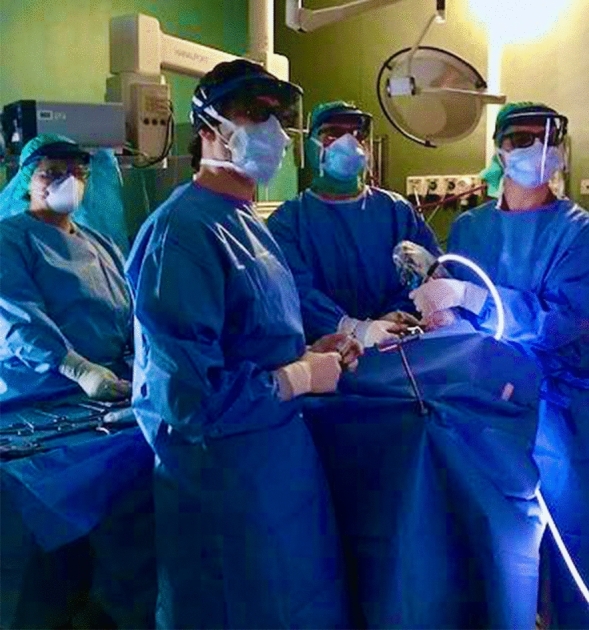Abstract
Purpose
During the Covid-19 pandemic every hospital has had to change its internal organization. Different institutions have highlighted the risks connected with endoscopic endonasal surgery. The goal of this paper is to illustrate the feasibility of pituitary region surgery during the SARS-CoV-2 pandemic.
Methods
After two negative Covid tests were obtained, three patients with macro GH-secreting tumors, and two patients with micro ACTH-secreting tumors resistant to medical treatment underwent surgery during the pandemic. During the surgery, every patient was treated as if they were positive.
Results
Neither operator, nor patient have developed Covid symptoms. The two neurosurgeons performing the operations underwent two Covid swab, which resulted negative.
Conclusions
Pituitary surgery is a high risk non-urgent surgery. However, the method described has so far been effective and is safe for both patients and healthcare providers.
Keywords: Endoscopic endonasal surgery, Covid-19 pandemic, Pituitary surgery
Thus far, Italy has been one of the countries most devastated by the Covid-19 pandemic. Every hospital has had to change its internal organization and re-assign every ward in order to deal with the outbreak. The majority of operating rooms have been transformed in temporary Covid-intensive care units or are at a stand still, with the only exception being emergency procedures. Hence, pituitary surgery is seldomly considered an emergency [1]. At the Molinette Hospital, Città della Salute e della Scienza di Torino, which is the only neurosurgery unit that performs select complex elective surgeries in our region, about 90 endoscopic procedures for pituitary diseases are performed yearly. SARS-CoV-2 dramatically changed the way neurosurgical units function and has markedly increased wait time, especially for patients with benign tumors such as pituitary adenomas.
Different institutions have highlighted the risks connected with endoscopic endonasal surgery [2, 3]. Likely, the virus becomes aerosolized while operating on the upper respiratory mucosa tract and remains airborne for more than 3 h thereafter [4].
Being able to still perform elective surgery in a Covid free department, a senior neurosurgeon and a senior endocrinologist selected some surgical cases from the waiting list (29 patients planned to undergo endoscopic endonasal surgeries). In such patientsthe benefits advocated by surgery overcame the risks of hospitalization. Patients affected by hormone secreting pituitary adenoma with no or partial response to the therapy were chosen.
Patient selection included the following: (a) Three patients with macro GH-secreting tumors, one with drug-resistant headaches, one with relapsed multiple mieloma who needs chemotherapy and one with symptomatic visual defect; (b) Two patients with micro ACTH-secreting tumors resistant to medical treatment. The first patient underwent surgery on the first of April 2019.
To prevent infecting the operators, necessary precautions were taken with each patient who agreed to undergo endoscopic endonasal surgery included:
an initial Covid-19 home test that was performed 7 days before hospitalization. From the time of testing, an absolute home quarantine without leaving nor contacting family members whatsoever.
a second Covid-19 test performed in the hospital the day before surgery. If negative, the patient could enter the ward.
During an endoscopy surgery, every patient is treated as if they are positive. The operating team solely consists of five people: two neurosurgeons, an anesthesiologist, a scrub nurse and a nurse anesthetist. The operators wear surgical caps, polarized glasses for 3D endoscope, ffp3 masks with filter with a surgical mask over, face shields, waterproof gowns and two pairs of gloves (Fig. 1). The personal protective equipment is put on and removed following hospital guidelines. Everything that might be needed for surgery is brought into the room so that once surgery starts, the doors remain closed for the entire operation and no one enters, nor exits. During the operation, any maneuver that might cause droplet formation is avoided. Even the drill and debrider are banned despite they are otherwise routinely used. At the end of surgery disposable “contaminated equipment” is left in the room and eliminated as if in a Covid positive room. After surgery, the patient goes back in the neurosurgery, covid free ward and is attended to as usual.
Fig. 1.

The operators wear surgical caps, polarized glasses for 3D endoscope, ffp3 masks with filter with a surgical mask over, face shields, waterproof gowns and two pairs of gloves
Neither operator, nor patient have developed Covid symptoms. The entire staff involved in the operations underwent both Covid swab and immunological testing, which resulted negative.
Unfortunately, the Covid-19 pandemic has affected every aspect of hospital planning, many surgeries have been canceled due to a negative cost benefit ratio. Pituitary surgery is undoubtedly a high risk non-urgent surgery. However, considering that the long term effects of the Covid epidemic are not known, neurosurgeons should find alternative pathways to offer the necessary treatment to everyone. The method described has so far been effective and is safe for both patients and healthcare providers.
Funding
No funding was received for this study.
Compliance with ethical Standards
Conflict of interest
On behalf of all authors, the corresponding author states that there is no conflict of interest.
Ethical approval
No ethical approval was needed.
Patient Consent
At hospital admission, the patients have consented to undergo surgery and clinical studies.
Footnotes
Publisher's Note
Springer Nature remains neutral with regard to jurisdictional claims in published maps and institutional affiliations.
References
- 1.Barkhoudarian G, Kelly DF. Pituitary apoplexy. Neurosurg Clin N Am. 2019;30(4):457–463. doi: 10.1016/j.nec.2019.06.001. [DOI] [PubMed] [Google Scholar]
- 2.Patel ZM, Fernandez-Miranda J, Hwang PH, et al. Letter: precautions for endoscopic transnasal skull base surgery during the COVID-19 pandemic. Neurosurgery. 2020 doi: 10.1093/neuros/nyaa125. [DOI] [PMC free article] [PubMed] [Google Scholar]
- 3.https://www.sbns.org.uk/index.php/about-us/news/
- 4.Zhu W, Huang X, Zhao H, Jiang X. A COVID-19 Patient who underwent endonasal endoscopic pituitary adenoma resection: a case report. Neurosurgery. 2020 doi: 10.1093/neuros/nyaa147. [DOI] [PMC free article] [PubMed] [Google Scholar]


